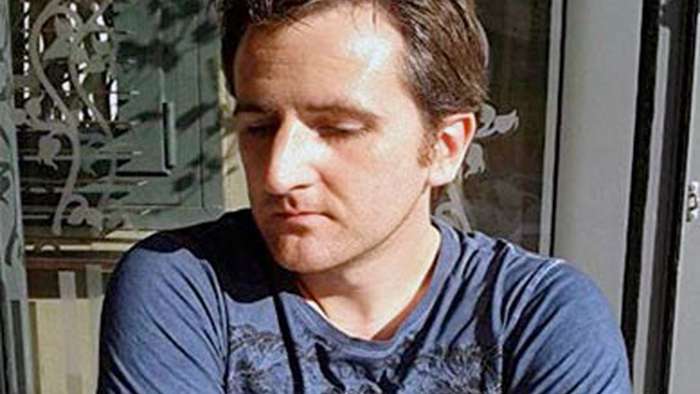Swans Defy Music’s Law of Diminishing Returns
Author Nick Soulsby picks nine highlights from the band’s extensive catalog.
“When…When we were young. We had no history, so nothing to lose. Meant we could choose, choose what we wanted then, without any fear or thought of revenge. But then you grew old and I lost my ambition…”
"God Damn The Sun” – Swans
The music industry is a meat grinder churning through a constant stream of new faces and styles as each fresh generation chooses the sound that will make it standout from parents, elder siblings, more senior years at school. We’re all familiar with one-hit wonders and flash-in-the-pan flavors of the month who peak only long enough for us to wind up asking “whatever happened to…?” Then there’s the ranks of contenders who made it as far as the indies, or maybe a half decade — one, two albums — on a major label, before descending and taking their cult following with them. Finally there’s the dark sea of semi-professional/semi-amateur musicians who will stay comfortably ensconced in hand-to-mouth touring, local acknowledgment, niche communities and day jobs.
The wall-to-wall media focus on stardom disguises how few artists forge an enduring career in the spotlight — but the glare of fame also masks how cruel age is to near all of them. Success seems to mean giving up on any pretense of inspiration, accepting music as a punch-in/punch-out job, reciting a back catalog of greatest hits. Most lapse into pale pink imitation of their most recognized moments: who needs to hear any Rolling Stones album after 1978? Some co-opt the sound of other scenes in ever-increasingly embarrassing attempts to stay relevant. Others turn out to have only ever had one real idea and they play it out until their entire repertoire is a indistinguishable sound-a-like mush. A beautiful and rare few hold to the idea that they are artists not just musicians and instead follow the muse down avenues that no longer appeal to most listeners: how many Prince songs written after 1995 can you name? Musicians get comfortable with the same old musical furnishings. They fall into predictable habits and recognizable tics, or they that find squeezing into the latest sonic fashions only emphasizes how far past their peak they’ve gone. This isn’t some brutal dissection of musicians, the point is that musicians are normal human beings and — just like the undistinguished majority of us mere mortals — they do not possess an Access-All-Areas pass to eternal creativity.
From a young age I’ve been fascinated by the possibility of escaping this remorseless reality. As a teenager first discovering music it was hard not to find something enticing in the brutal, yet eternally popular, option of “live fast, die young and leave a good-looking corpse.” This was the mid-‘90s: Kurt Cobain’s body was draped over rock music; Tupac Shakur’s riddled musculature and Biggie Smalls’ corpulent frame piled on top of hip hop. Distasteful as any right-thinking person might find it, death short-circuits inevitability and means no one ever needs to acknowledge that they would have become celebrated relics at best, more likely has-beens. Death is always an option if you never want to show anyone you failed.

Swans
As I age, and the virtues of life have become ever clearer, my interest has turned to the possibility of living, and aging, without having to surrender creativity — can it be done with the minimum of repetition or predictability or novelty or insincerity? It’s a rarely travelled road for the simple reason that laziness is a very natural human instinct. Our best qualities always go hand in hand with a flipside: think of laziness as another word for proficiency and professionalism given that having learnt to do something well, the quickest way to a result is repetition of a known solution. Rejuvenating oneself, rewiring one’s learnt behaviors, erasing one’s skills and finding new ones is bloody hard work! It requires significant time to even realize which fundamentals need to change, let alone to learn how to do things differently — this is not the decision of a mere moment, nor something one just clicks one’s fingers to achieve. When it comes to the world of music, I and see a lot of perfectly average human beings who battle precisely the same emotional, physical and creative limitations as any individual in any position the world over. Of the one percent to achieve real note, less than one percent win out over age.
So, when I look at Michael Gira and Swans, I believe I’m seeing one of those previous few entities to successfully navigate an entire life at a peak of creativity. That’s what came to enthrall me after a year buried inside the band’s life and works. Gira’s path is beyond most human beings. Rational people want comfort, a chance to relax, to savor the fruits of labor, to bask in a job well done. Gira has looked at every album he’s ever created and seen fault, flaw and failure. He doesn’t hear the people telling him each album is a work of genius, or saying he’s done well — there’s a terror of failure somewhere inside him and a near constant disappointment. Negative energy is an underrated motivational force in life — most of us move further, faster, when under threat (ignore what the self-help gurus try to tell you, nothing makes for movement like a kick in the ass.)

Michael Gira – photo by Andy Catlin
Always seeking to surpass previous highs means Gira has burnt out nearly everyone who has ever been part of his band, but that constant churn has furthered the process of learning and evolution. The refusal to be comforted or for any moment to be “good enough” means doing things that normal people would not: erasing the sound Swans built a reputation on across the ‘80s; rebuilding an audience then assassinating Swans at a point when acclaim was finally returning; reforming over a decade later only to surpass all that had come before, then disbanded the lineup at a point when things were finally stable out of a fear of growing stale. Swans have grown a new generation of fans not out of nostalgia — though legend precedes them — but by building a music that expresses a fundamental human experience in all its pains and inhibitions; something beyond mere chords, stage sets and technique. Every time Swans performed they would suffer for the art — no one was allowed to go through the motions. To see someone age and never lose that youthful desire to prove themselves, to hold nothing back, to refuse to learn where to stop or go easy, I’m not sure I could live that life, but I marvel at it because I think it’s the escape route from inevitable decline and decay.








